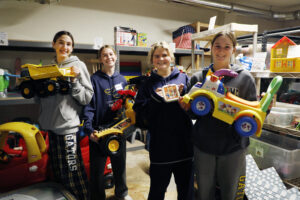Olivia Jacocks (2013) runs a tight, but chaotic ship during her Social Action days. Between various discussion groups, coloring, and actual lessons, Jacocks has the freshmen class booked with activities and knowledge surrounding Human Rights. While a relatively new freshmen rotation and an even newer teacher, Jacocks takes the reigns and shows her students what being human really means.
Why did you choose to become a SAL?
Essentially, I felt like I had a lot to share. During Junior year, I felt increasingly attached to issues involved with various aspects of diversity– specifically, gender and sexual orientation– and I felt like there are a lot of issues out there that I would have liked to learn about as a freshman. I also felt like Human Rights is often a topic that feels very distant from our lives, and I wanted to try to teach it in a way that related those issues back to us. Also, I’m considering a career as teacher, so I thought it would be useful to have this experience.
What is so interesting about your rotation (human rights)?
I really try to minimize the time spent in a traditional lecture set-up, and I try to make it much more about the students. So my rotation is really based on discussion and thinking about different perspectives, as opposed to just trying to make them memorize facts that they won’t remember in two days.
As to the actual topics, I just think that the topic of human rights is just so darn applicable to our everyday lives. There are so many microcosmic examples of larger issues that manifest themselves in our lives, and we don’t even realize it because we have grown accustomed to adapting to society’s odd little rules. For example– when you were little, did a boy ever hit you (and not because you stole his pokemon card), but when you told a teacher or other authority figure about it, they said playfully that “it means he likes you”? The idea that when a boy hits you it means he likes you is a mentality that relates to larger issues– domestic abuse, and even violence against women in general. It may seem silly, but it is an example of how the issues we discuss in our rotation truly permeate our society.
Top Three things you had to do to prepare for this year?
1) Finding a site. I found out the hard way over the summer that it is not easy to find a service-related site involving human rights that can accomodate fifteen freshmen. I had to do a lot of research in order to find our current site– the Sewall-Belmont Museum, a women’s rights museum tucked away in a corner of DC. I really like going there, though, and I think at least some of the freshmen get a lot out of it. At the very least, they enjoy taking the metro and walking around DC.
2) Practice. I have not-so-fond memories of anxiously pacing in my room, manically discussing gay rights with my stuffed animals. During the summer, there were days in which we had to present lessons to our fellow SALs. Even though they were all my friends, it was still nerve-wracking. But necessary.
3) Sal sleepovers! I got very, very close to the other SALs during the summer, especially during our sleepovers. We have, however, continued to have them throughout the year. I’m not entirely sure how much ‘preparation’ happened, but we would sometimes talk about things we were doing with our freshmen, and they would often give me inspiration for activities or an much-needed morale boost. And we also make pizza sometimes, which is always relevant.
Is being a SAL harder that going to a sight everyday?
I don’t want to say yes, but…. yes. I often hear people excitedly talking about how they don’t need to do any work for Social Action. But I always have to frantically prepare my lesson plans, print out things, load videos, and do a hodgepodge of odd things that you never suspect would be an issue. Like, laminating things. And finding paper clips. And yarn! I still have yet to find usable yarn for my spectrum activity.
Best/Worst thing about teaching Freshmen?
Freshmen are great because they are a bit younger, and therefore a little less resolved in their views of the world and often more open to having different kinds of conversations. I find their opinions fascinating because they are still developing those world views, and it’s also kind of fun to remember myself at that age and how much I have changed since then. Every now and then I’ll see a freshman who reminds me a lot of myself at that age, and I like to think about how much they’ll grow in the next few years– just like I did.
But sometimes it is difficult teaching freshmen because it is different than if I was teaching a group of my peers. The freshmen are sort of still getting their grips on how things are done here, so I can’t exactly have the kind of really open, freeform discussions I would like to have. Believe me, I tried. You just have to find ways of getting around that particular gap. Like, I use a stress ball in the shape of a globe that they toss around to each other during conversations, and only the person who has the globe is allowed to speak. Except I can just kind of speak whenever, because I’m in charge.



